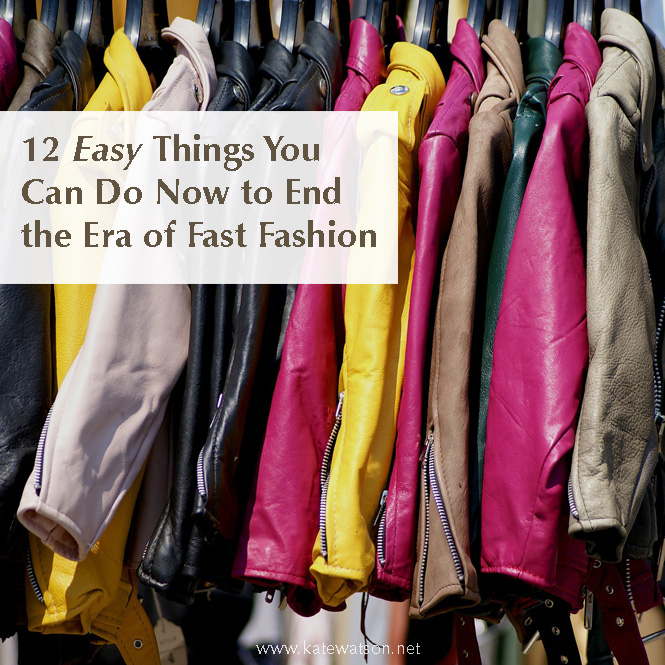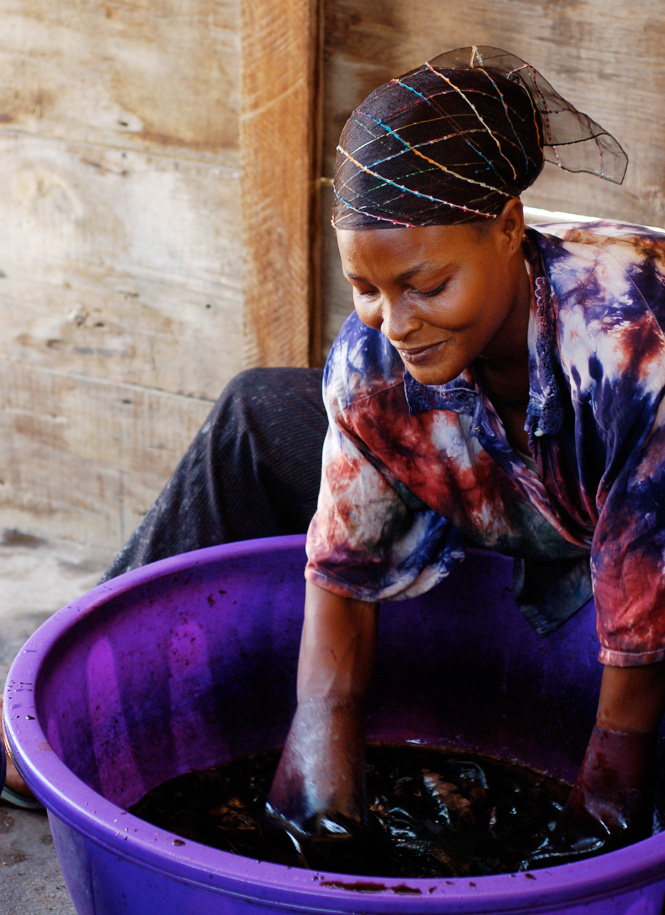Do you ever wish there was an easier way to be a conscious consumer? We live in an era of fast fashion, where clothes are designed to be bought and discarded seasonally. While I’m concerned about the impact that has on our environment and people, I don’t have the bandwidth to become an expert in sustainable fashion. That’s why I reached out to my friend, clothing designer Alice Grau, for advice and tips on what we can do to be more conscious about our clothing habits. Take it away, Alice.

I remember sitting in my “Psychology of Dress” class way back in 2001 when my professor said, “One day we will have clothes we only wear once and then throw away.” Well, in case you missed the memo—one day is here.
Unfortunately, this is not the exciting global development my professor imagined it would be. Thanks to an array of media covering the topic over the last couple of years, it is quickly becoming common knowledge that “fast fashion” has some dire consequences, both for the environment and for the people making the products.
According to a 2013 study by the Danish Fashion Institute, fast fashion is second only to big oil when it comes to negative impact on the environment. And, we need look no further than the death toll of the Rana Plaza collapse to understand the value the fast fashion industry places on human life.

Aerial view of the Rana Plaza building collapse that killed more than 1,100 garment workers in Bangladesh and wounded 2,200 more. Photo by rijans. Licensed under CC BY-SA 2.0.
Maybe seeing devastation of that magnitude shook you and caused you to start thinking a bit more about your clothing purchases. Or, maybe you have read one of the many articles or books that have come out in recent years on the topic. Or, maybe you just watched The True Cost on Netflix and your head is swimming with a million questions.
As for me, I am just an idealistic fashion designer. I have worked in “slow fashion” for seven years now. The organization I work with, Global Mamas, puts out 1.5 product lines per year. The producers we partner with batik cloth by hand, painstakingly cut out each pattern piece, and some sew with hand-powered machines.

Global Mamas producer Mary Koomson batiking cloth by hand
I don’t have all the answers for how to change this massive industry, but I do know that consumer buying habits have a way of swaying the powerful.
Today I am going to share some examples of things you can do to make changes to your buying habits and become a more thoughtful consumer. Let’s take it back to the basics. Do you remember the 3R’s? Reduce, Reuse, Recycle. Consider following these practices, in that order.
REDUCE
- Simply buy less clothing.
- Buy higher quality goods that will last longer.
- Invest in timeless, core wardrobe pieces that you can build around.
- Take the time to research what you are buying. Get to know the ethics of the business you are supporting. I highly recommend seeking out businesses that practice the principles of fair trade.
- Wash your garments less frequently and steer clear of garments that require dry cleaning. Line dry your clothes if you can.
REUSE
- Don’t get rid of something just because it is out of fashion. It will probably come back into style in your lifetime, or pack it away for your kids. They might be like me and LOVE your vintage collection.
- Secondhand stores are your friend! Pay them a visit frequently and enjoy the bounty buried in the racks. You can take in one load and pick up another. If you have really good stuff you can even sell it on consignment through some stores.
- Host a clothing swap with your friends, visit your local mom-to-mom sale, or stop by your neighbor’s yard sale.
- Tattered T-shirts can be used for a kitschy memorabilia quilt and cleaning rags!
- Buddy up with your neighborhood tailor, or embrace the grunge look and shorten your dress, skirt, pants, blouse to mix up an old item.

Alice’s wedding dress was repurposed from the dress both her grandmother and mother wore.
RECYCLE
- If your clothes are in good condition and you are just ready to move on, find a local charity to donate them to (research it, first).
- Items that aren’t fit to be resold can literally be recycled! Don’t just throw them away. Some thrift and even large retail stores will collect unwearable clothing and sell items to textile recycling companies where clothes are turned into industrial cleaning cloths or back into fibers to make new fabric.
How do you get started? Pick just one of these suggestions and integrate it into your lifestyle.
Then pick another, and another, and slowly, without even knowing it, you will be making a positive impact on people you have never met, improving our environment, and maybe even saving a buck.
You do vote with your dollar. And, when we collectively start spending less on fast fashion and start investing in a smaller number of high-quality, fair trade, organic goods, the industry will eventually have to respond.

Global Mamas producer Janet Aba Sagoe sewing with her hand-powered machine
As we support artisanal, fair trade brands, they can grow and bring one more employee away from a sweatshop. As we stand in the gap for those who have been silenced, governments will be persuaded to take a stand for their people.
We have the ability to make a change, so I hope you will join me in a new generation of Industrial Revolution!
Do you have any questions for Alice? If so, please leave them in the comments and we’ll see if she’ll come back and answer them for us. Thanks, Kate
 Alice Grau is the creative director of Global Mamas, a fair trade brand committed to partnering with Ghanaian artisans to help them achieve prosperity in their lives and communities. Alice has been passionate about social justice, sustainability, and fashion since she was a young girl, and finally found a way to merge these passions by working with Global Mamas. She also loves spending time with her husband and two children, traveling, volunteering at her church, and trying to cook complicated international dishes with veggies from her local CSA.
Alice Grau is the creative director of Global Mamas, a fair trade brand committed to partnering with Ghanaian artisans to help them achieve prosperity in their lives and communities. Alice has been passionate about social justice, sustainability, and fashion since she was a young girl, and finally found a way to merge these passions by working with Global Mamas. She also loves spending time with her husband and two children, traveling, volunteering at her church, and trying to cook complicated international dishes with veggies from her local CSA.
You can connect with Global Mamas via their Facebook Page or Twitter.

















8 Ethical Fashion Brands You Can Afford + Feel Good About Buying » KateWatson.net - […] week, fashion designer Alice Grau shared 12 simple strategies to combat this era of fast fashion by reducing, reusing, and recycling your clothing. This week, I asked her to share some of her […]